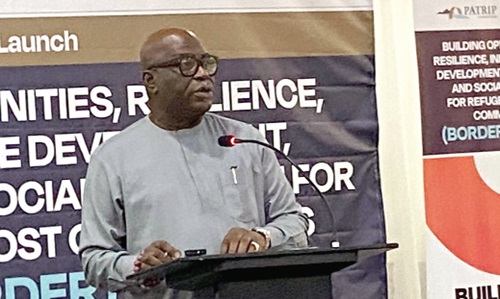Three-year project to empower border communities in the Upper East and Upper West regions, to strengthen their resilience against climate and conflict shocks through the development of infrastructure and livelihood support, has been launched in Accra.
It is aimed at enhancing social cohesion by promoting peaceful coexistence among host communities and refugees.
Known as "Building Opportunities, Resilience, Infrastructure Development, Ecosystems and Social Cohesion for Refugees and Host Communities (BORDER) project, the initiative is also intended to improve access to basic services such as water, sanitation, health and food security in vulnerable communities.
Powered by the World Vision Ghana (WVG), in collaboration with the World Vision Germany and RACED Ghana, with funding from Germany via the KfW Bank through the PATRIP Foundation, a German NGO, the BORDER project is also to promote climate adaptation and environmental sustainability through the training of stakeholders in the respective border communities, as well as community initiatives.
Addressing the ceremony, the Deputy Minister of Education, Dr Clement Apaak, acknowledged that many children in the northern border regions of the country, particularly those in refugee and host communities, continue to face severe barriers to education.
These, he said, included inadequate school infrastructure, lack of water and sanitation facilities and food insecurity.
Background
The Upper East and Upper West regions bordering Burkina Faso are said to be experiencing increasing socio-economic pressures due to climate shocks, food security, environmental degradation and a growing refugee influx caused by insecurity in neighbouring areas.
![]()
The invited guests at the launch
The BORDER project will, therefore, target five communities such as Zini, Tarikom, Issakatinga, Bansi, Fielmo and two refugee settlements in the Bawku West, Binduri and the Sissala West districts.
The project is targeted at 19,219 individuals, which includes 13,454 Ghanaians and 5,765 Burkinabe refugees.
It is also expected to impact an additional 33,657 people.
The Deputy Minister for the Interior, Ebenezer Okletey Terlabi, for his part, also observed that the BORDER project would lay the foundation for sustainable peace, security and resilience in some of the most vulnerable and strategically important communities.
Mr Terlabi said his ministry would work closely with NADMO, the Ghana Immigration Service (GIS), the Ghana Refugee Board and security services to ensure the success of the project.
Promise
Describing the initiative as a “Promise and not just a project,” the interim National Director of World Vision Ghana, Jean-Claude Mukadi, said, “It is a promise to support host families and displaced populations, who despite immense challenges, continue to embody strength, dignity and hope."
He gave the assurance that the challenges could be surmounted and transformed into opportunities for lasting peace and sustainable development with strategic partnership, shared vision and community-driven action.
Mr Mukadi expressed appreciation to the German government for its immense support of the mission of World Vision in the country.

